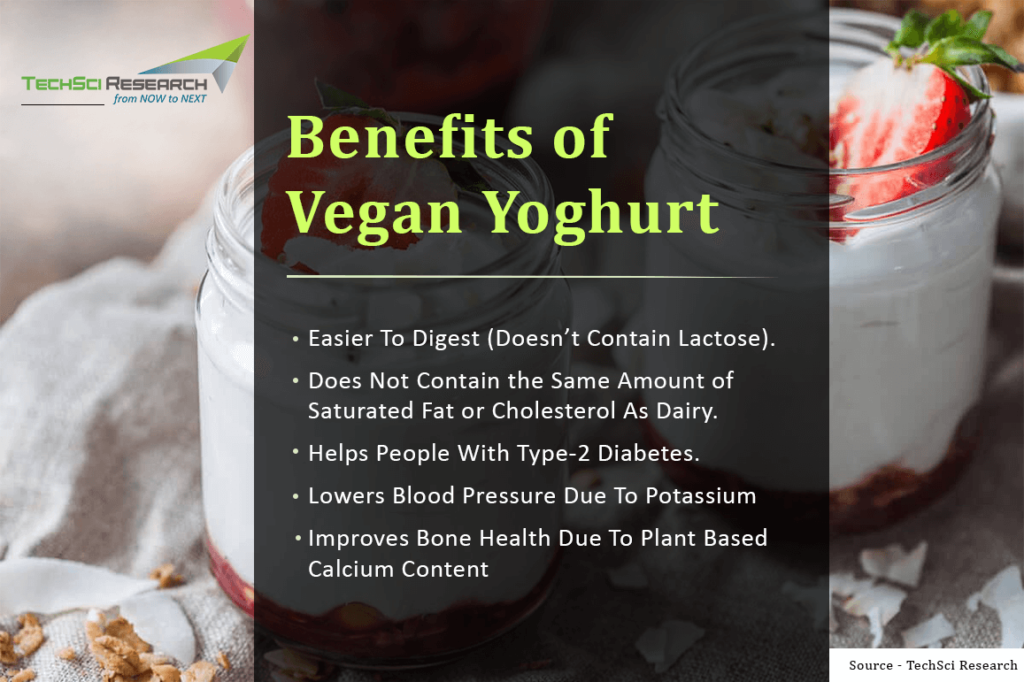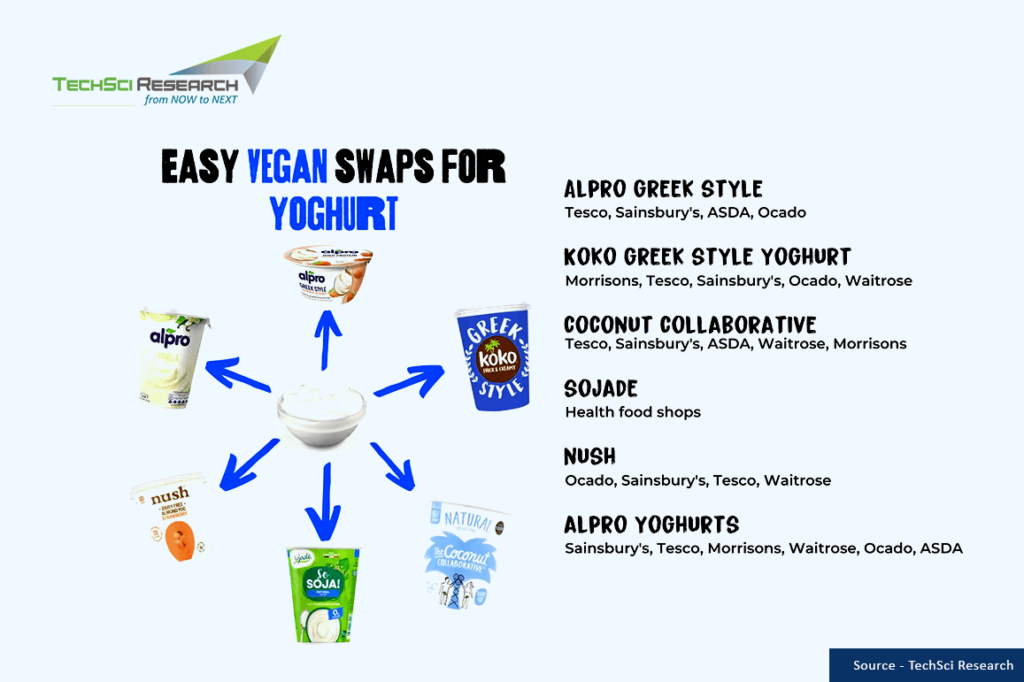All About Vegan Yogurt: A Guide to Choosing the Best Option
The popularity of veganism has continued to grow, leading to an increasing number of vegan-friendly products in the market. One of the fast-rising products is vegan yogurt. With the rise of health-conscious consumers, plant-based products are becoming more mainstream. Not only are they healthier than their dairy counterparts, but they also align with ethical and environmental values. In this blog, we will delve into everything vegan yogurt, from types, benefits, and how to make it at home, and more. This guide will help you understand what vegan yogurt is, its different types, and how to choose the best one.

What is Vegan Yogurt?
Vegan yogurt is a plant-based alternative to traditional dairy yogurt. It is a cultured product made by fermenting plant-based milks, such as soy, almond, coconut, or cashew milk, with probiotic bacteria. It is a great source of healthy probiotics, vitamins, and minerals, and is ideal for people who are lactose intolerant, vegan, or simply looking for a dairy-free option.
Types of Vegan Yogurt:
There are different types of vegan yogurt available in the market. Some of the popular ones include:
- Soy Yogurt: Soy yogurt is made using soy milk and is an excellent source of protein. Soy yogurt is very similar in protein content to dairy yogurt; however, it is lower in sugar, and higher in fat. It has a thick and creamy texture and can be used in smoothies, dips, and dressings.
- Almond Yogurt: Almond yogurt is made using almond milk and is ideal for people who are allergic to soy or looking for a nuttier taste. It has a slightly sweet taste and can be used in baking recipes.
- Coconut Yogurt: Coconut yogurt is made using coconut milk and is ideal for people who are looking for a thicker and creamier alternative. It has a slightly tangy taste and can be used in curries and soups.
- Cashew Yogurt: Cashew yogurt is made using cashew milk and is creamier and more decadent than other types of vegan yogurt. It is ideal for people who are looking for a dessert-like taste and can be used in smoothies, cakes, and muffins.
Benefits of Vegan Yogurt
- High in protein: Despite being made from plant-based ingredients, vegan yogurt is high in protein, making it an excellent choice for athletes, vegans, and those who want to build lean muscle. One serving can pack anywhere from 5-15 grams of protein, depending on the brand and flavor. Additionally, vegan yogurt is often made from soy, which contains all nine essential amino acids, making it a complete protein source. So, whether you’re looking to up your protein intake or build lean muscle, vegan yogurt is an excellent option.
- Probiotic-rich: Yogurt is known for its probiotic content, which can aid in digestion, support a healthy gut microbiome, and boost immunity. Vegan yogurt is no exception. Many brands of vegan yogurt contain various strains of probiotics, such as Lactobacillus acidophilus and Bifidobacterium lactis, which can help support a healthy gut. Additionally, vegan yogurt is often made with prebiotic fibers like inulin, which helps nourish good bacteria in the gut.
- Low in saturated fat and cholesterol: One downside of traditional yogurt is its saturated fat and cholesterol content. Fortunately, vegan yogurt is typically low in both. Most vegan yogurts are made with non-dairy milk, such as almond or coconut milk, which are naturally low in saturated fat and cholesterol. Additionally, soy-based yogurts contain heart-healthy polyunsaturated and monounsaturated fats that can help reduce inflammation and lower cholesterol.
- Versatile: Vegan yogurt comes in a variety of delicious flavors and can be used in a myriad of ways. Besides eating it straight from the container, vegan yogurt can be used in smoothies, as a substitute for sour cream or cream cheese, and in baking recipes. Whether you’re looking for a tasty breakfast option or a low-fat substitute for your favorite recipe, vegan yogurt has got you covered.
- Environmentally friendly: Finally, vegan yogurt is an environmentally friendly option. The production of traditional yogurt requires a vast amount of resources, including water, energy, and feed. In contrast, the production of vegan yogurt requires fewer resources and produces less waste, making it a more sustainable choice. Additionally, vegan yogurt is cruelty-free, making it a kinder choice for animals.
A Look at the best vegan yogurts
- Best cashew-based: Forager Project
- Best naturally sweetened: Oatly Natural Oatgurt
- Best with high protein option: Kite Hill Almond Milk Yogurt
- Best unique plant protein: Lavva Dairy Free Pili Nut Yogurt
- Best coconut-based: So Delicious Coconut Milk Yogurt
- Best thick and creamy: Siggi’s Plant-Based Yogurt
- Best almond-based: Silk Almond Milk Yogurt
- Best pea blend: Chobani
Tips on How to Make Vegan Yogurt at Home
Making vegan yogurt is not only easy and cheaper than buying, but it also gives you control of the ingredients and flavor. To make vegan yogurt, you will need a plant-based milk of your choice and a starter culture. You can use store-bought vegan yogurt as a starter culture or probiotic capsules, and a thickener like arrowroot or cornstarch. To make your yogurt, heat the milk in a saucepan, then add the starter culture and thickener. Stir, and transfer the mixture to a sterilized jar. Cover with a cheesecloth and leave it in a warm place to ferment. After a few hours, you will have delicious vegan yogurt ready for consumption.
Serving Suggestions for Vegan Yogurt
Vegan yogurt is incredibly versatile and can be incorporated into various meals or consumed by itself. You can add it to your morning smoothies, use it to make your favorite sauces or dressings, or add toppings like fruits, nuts, or granola and enjoy it as a tasty snack or dessert. Furthermore, it makes for a great substitute in recipes that require dairy yogurt, making vegan cooking a lot easier.
How to Choose the Best Vegan Yogurt:
Choosing the best vegan yogurt can be a daunting task, but here are some factors to consider:
- Protein Content: Look for yogurts that have a high protein content, such as soy yogurt, which can have up to 10 grams of protein per serving.
- Probiotic Content: Probiotics are beneficial bacteria that aid digestion and support the immune system. Look for yogurts that have live, active cultures.
- Sugar Content: Many brands add sugars or sweeteners to their products, which can negate the health benefits of vegan yogurt. Look for brands that use natural sweeteners, such as agave or stevia.
- Fat Content: Some vegan yogurts can be high in fat, so look for low-fat or non-fat options if you are watching your calorie intake.
According to TechSci Research report “Yogurt Market– Global Industry Size, Share, Trends, Opportunity, and Forecast, Segmented By Type (Flavored, Non-Flavored), By Form (Conventional Yogurt, Greek Yogurt, Set Yogurt, Frozen Yogurt, Yogurt Drinks, Others), By Packaging (Plastic Bottles, Tetra Packs, Others), By Sales Channel (Supermarkets/Hypermarkets, Convenience Stores, Departmental Stores, Online, and Others), By Region, By Competition Forecast & Opportunities, 2018-2028F,” the Global Yogurt Market valued at USD112.10 billion in 2022 and is likely to exhibit a robust growth in the forecast period with a CAGR of 6.75% through 2028. The market growth is driven by increasing consumer preference for healthier options, demand for non-dairy yogurts, rising popularity of low-calorie and high protein yogurts, increasing consumer awareness and focus on convenience.
The rising demand for healthier food products, particularly those with probiotics, has played a significant role in driving the growth of the market. Consumers are choosing yogurt as a nutritious and convenient breakfast option due to its high nutrition content. Some companies are incorporating different types of fruits, nuts, and even vegetables into their yogurt products to appeal to health-conscious consumers. In addition to the demand for healthier and diverse yogurt products, packaging design has played a crucial role in the growth of the global yogurt market. Innovative packaging design has brought more convenience for consumers, especially who are busy and on-the-go. The rise of yogurt drinks in flexible pouches is a testament to this trend. These convenient packages make it easy to grab a snack or breakfast on the go, making it easy for consumers to incorporate into their daily routine.

Conclusion:
In conclusion, vegan yogurt is a nutritious, versatile, and environmentally friendly option for those who follow a vegan diet or are simply looking for a healthier alternative. Vegan yogurt is high in protein, probiotic-rich, low in saturated fat and cholesterol, and comes in a variety of delicious flavors. Switching to vegan yogurt has numerous benefits, from better gut health to overall well-being. With a variety of plant-based milk bases and starter cultures to choose from, vegan yogurt is an excellent alternative for those who are dairy intolerant, vegan, or plant-based enthusiasts. So, whether you’re looking to build lean muscle or support a healthy gut, vegan yogurt is an excellent choice. Additionally, by choosing vegan yogurt, you’re making a compassionate decision that benefits the environment and the animals. So why not give vegan yogurt a try and see what all the fuss is about.



